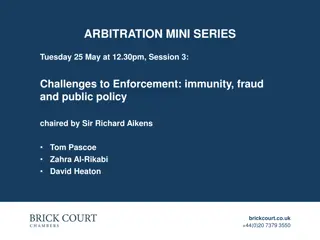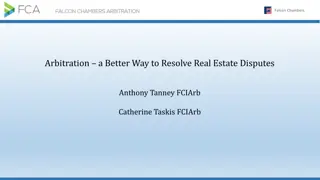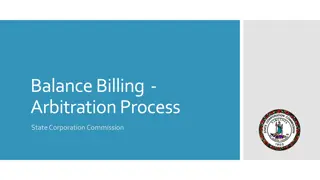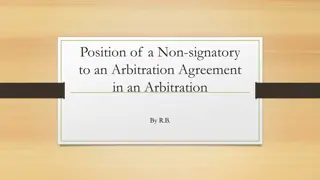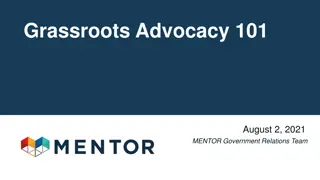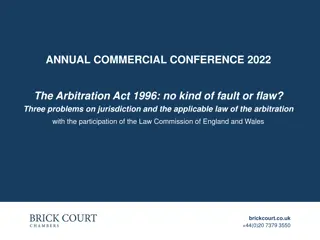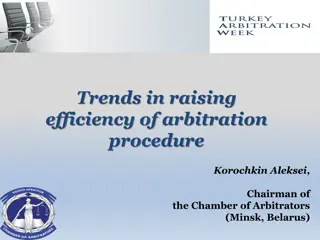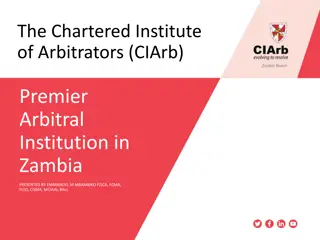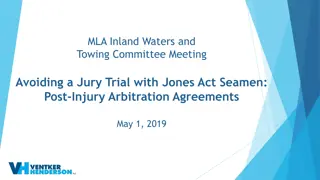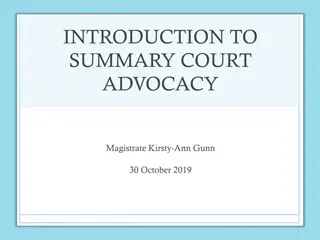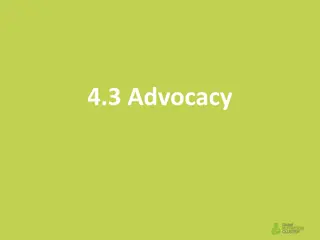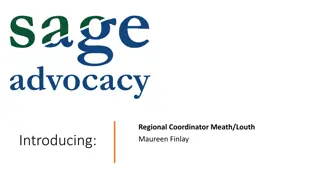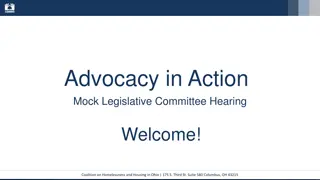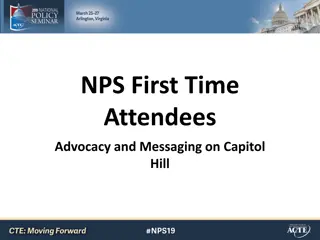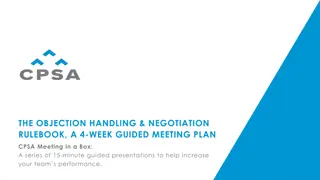Mastering Arbitration Advocacy: Handling Questions Effectively
Enhance your arbitration advocacy skills by learning how to field and answer questions from arbitrators confidently. Explore tips such as staying calm, listening attentively, and responding succinctly to challenging inquiries. Develop a strategic approach to address interruptions and navigate through various questioning scenarios effectively.
Uploaded on Sep 14, 2024 | 0 Views
Download Presentation

Please find below an Image/Link to download the presentation.
The content on the website is provided AS IS for your information and personal use only. It may not be sold, licensed, or shared on other websites without obtaining consent from the author. Download presentation by click this link. If you encounter any issues during the download, it is possible that the publisher has removed the file from their server.
E N D
Presentation Transcript
Seventh Annual Middle East Vis Pre-Moot Training 1
MAKING A RESPONSIVE ARGUMENT Fielding and Answering Questions from Arbitrators
In a perfect world You will be asked a clear question, which you understand perfectly, and which can be answered: Fully; Correctly; Succinctly (in one or two sentences); And which leads you to your next point.
More often, however Questions from the Arbitrators will present a challenge as you strive to deliver your full argument within your time allocation. Some questions may be unclear; Some questions may be based on a misinterpretation or misunderstanding of the Record; Some questions may be a distraction from your argument; But, you still have to answer them.
Before you do anything else: Get your attitude in check. It is easy to regard questions as unwelcome interruptions, and to respond defensively or even with hostility. Your attitude should be calm, open, and measured; Do not let the Arbitrator feel that you are angry or annoyed that s/he has interrupted you.
Rule of Thumb: Listen to the question. KISS (Keep It Simple and Succinct) 1. 2.
1. Listen to the Question When an Arbitrator directs a question at you: Immediately stop talking, and permit the Arbitrator to finish their entire question or statement before you respond. Look at the Arbitrator while they are talking to you. Listen with an open mind (attitude).
1. Listen to the Question Listening requires empathy; put yourself in the Arbitrator s shoes. What do you know about the Arbitrator? Has s/he asked about an area of the law that interests them, or that they practice in? What is the question about? Does it reveal that they may not understand the legal question, or the factual background? Does the question reveal an area of experience, or inexperience? Is the Arbitrator also a coach? This is quite common at the Vis Moot, and may reveal that the Arbitrator is asking a question that his or her own team has wrestled with or produced a different answer for.
1) Listen to the Question No matter what: always be respectful. Never interrupt the Arbitrator, or cut them off before they have finished their question or statement. Never tell an Arbitrator that they are incorrect (even if they are!); Always remain diplomatic and polite. Most importantly: never ignore a question.
2) Keep It Simple and Succinct If possible, keep your answer to 1-2 sentences. Always answer the question first: Does the Record show that the Claimant granted power of attorney to its representative? Yes/No. Then, offer an explanation. Does the CISG govern the question of security for costs? Yes/No. Then, offer an explanation. What grants us the authority to examine the intent of the parties when they drafted this contract? Article 8 CISG Etc.
2) Keep It Simple and Succinct When an question is more complex than a simple yes or no : Offer a signpost: There are two reasons: the first , and the second . That question can be answered in three parts: the first . There are three elements in awarding security for costs When a question is actually two or more questions joined together: Write down the question as it is being asked; Answer the questions in the order they were asked; Show the Arbitrator you listened and understood: The question you ve asked is really two separate questions: first , and second .
1) Keep It Simple and Succinct After you ve answered the question, move directly on to the rest of the Argument. If the question sidetracked you, take a deep breath and check your outline to remind you of where you left off. Signal to the Arbitrators: To briefly return to my previous point If the question provided you with an opportunity to move forward in your argument, promptly do so: This leads me to my next point Turning now to the next issue,
How to Respond to Bad Questions? 1. Identify the problem: what makes the question bad? Question is unintelligible. Question is unclear. Question is out of the scope of proceedings.
Unintelligible Questions: This is often the result of a language barrier. Ask the Arbitrator if s/he can reformulate it/rephrase it for you. Reserve this approach for when there is no other alternative. In other words, don t try to buy time this way! The Arbitrators will catch on.
Unclear Question You understood some parts, but not all of the question, or what sort of information the Arbitrator is seeking. Offer your own clarification first: Let me see if I understood correctly: you would like to know ? To be clear, are you asking about ? After giving the Arbitrator an opportunity to clarify, respond directly to the question as it has been clarified.
Unclear Question If, after providing your own clarification, and receiving the Arbitrator s clarification, the question remains unclear: Do not waste any more time; Offer the Arbitrator a lead : A lead guides the discussion back to clarity by focusing on the big issues addressed within the unclear question: Let me see if I can answer your question by addressing the main issue your question references, which is ______ (fill in the blank). Shows the Arbitrators that you are in command of the proceedings and willing to engage with them.
Out of Scope of Proceedings: Sometimes, Arbitrators ask about a fact not in the Record, or an issue not relevant to the case. Diplomatically turn attention back to the present case: In our view, that issue has been left to future proceedings Procedural Order No. 1 has established that these proceedings are to address only the issues presented in that document, and so our arguments are focusing on those for now.
How to Respond to Good Questions? Good questions aren t necessarily easy to answer, but they are clear, well-reasoned, and within the scope of the proceedings. Identify a strategy for dealing with: Questions about Inconsistencies Persistent Questioning Rabbit Holes Friendly Questions Inviting Concessions
Questions about Inconsistencies You say in situation A1 that B follows, but when we asked your co-counsel [or opposing counsel] about situation A2, she said that C would follow. How do we resolve the inconsistency with your argument? Ask yourself: are B1 and B2 equivalent? Probably not; so, explain the factual differences between the two situations, and resolve the inconsistency. There are factual differences between the two situations you ve referred to. One key difference ________, and there may be others as well. As a result, while it might be correct that C follows A2, it does not necessarily follow that in situation A1, C would follow as well. Don t forget that you will have to support your analysis with case law and reference to the Record.
Persistent Questioning An Arbitrator may ask the same question over and over again. This may be because of a language barrier, or it may be because the Arbitrator genuinely feels that you have not answered the question. After 3 or 4 cycles: Apologize for the confusion, and redirect attention. I m sorry that I haven t been able to satisfactorily address your question, but instead of simply repeating myself, let me see if I can address your question as I move forward with my presentation. Then, move on.
Rabbit Holes Some arbitrators enjoy philosophical conversations or academic discussions about the legal issues in the problems. Unfortunately, we only have 15 minutes. Go back to KISS. Always keep the focus of the Arbitrators on your client s problem, and the outcome your client is seeking. Remind the Arbitrators that you must be respectful of your client s time and your opposing counsel s time as well: This question leads us into a fascinating policy discussion, but I must be mindful of my client s time and the time of my colleagues as well. So, allow me to summarize my point on this matter and move on
The Friendly Question Often, Arbitrators lob a softball meaning they ask a question intended to help you make your argument. you make your argument. intended to help The most difficult part of answering a friendly question is being able to spot it. You will miss the friendly questions if you have a bad attitude (remember: listen with an open mind!). Arbitrators will notice if you miss a friendly question, and will probably remark on your attitude when they give you comments.
The Invited Concession Arbitrators will sometimes invite a concession: Obvious: Do you concede .? Less obvious: Are you suggesting .? Downright sneaky: You said this, but surely what you intended Are you in fact implying .? intendedto say was . Or, Tread carefully: concessions can also sometimes undercut your arguments, or damage your claims. In the context of the Vis Moot, they are often best avoided. can be be wise under some circumstances, but they can
Conclusion: Listen KISS Spend as little time on bad questions as possible. Arm yourself with strategies for answering good questions.



